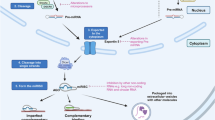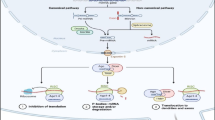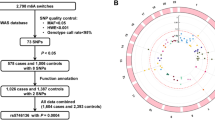Abstract
Aberrant expression of miRNAs plays critical roles in cancer development. Single nucleotide polymorphism (SNP) in miRNA precursors may affect miRNA expression levels. An important SNP in the pre-mir-27a with a A to G change (rs895819) was identified. Several original studies have explored the role of this SNP in cancer risk, but the results of these studies remain conflicting rather than conclusive. Therefore, we performed a meta-analysis of the published studies to derive a more precise estimation of the association between pre-mir-27a rs895819 polymorphism and cancer risk. In this meta-analysis, a total of 6 case–control studies (including 3,255 cases and 4,181 controls) were analyzed. The results of the overall meta-analysis did not suggest any associations between pre-mir-27a rs895819 polymorphism and cancer susceptibility. However, an decreased risk was observed in the subgroup of breast cancer patients (G vs A: OR = 0.90, 95 % CI = 0.83 ~ 0.97; P heterogeneity = 0.75) or in the subgroup of Caucasian race (G vs A: OR = 0.90, 95 % CI = 0.83 ~ 0.97, P heterogeneity = 0.78, I 2 = 0; AG vs AA: OR = 0.84, 95 % CI = 0.75 ~ 0.94, P heterogeneity = 0.35, I 2 = 3.7 %; GG+AG vs AA: OR = 0.85, 95 % CI = 0.76 ~ 0.94, P heterogeneity = 0.48, I 2 = 0). The findings suggest that pre-mir-27a rs895819 polymorphism may have some relation to breast cancer susceptibility or cancer development in Caucasian.



Similar content being viewed by others
References
Siegel R, Naishadham D, Jemal A (2012) Cancer statistics, 2012. CA Cancer J Clin 62:10–29
Lichtenstein P et al (2000) Environmental and heritable factors in the causation of cancer–analyses of cohorts of twins from Sweden, Denmark, and Finland. N Engl J Med 343:78–85
He L, Hannon GJ (2004) MicroRNAs: small RNAs with a big role in gene regulation. Nat Rev Genet 5:522–531
Anglicheau D, Muthukumar T, Suthanthiran M (2010) MicroRNAs: small RNAs with big effects. Transplantation 90:105–112
Kutanzi KR et al (2011) MicroRNA-mediated drug resistance in breast cancer. Clin Epigenetics 2:171–185
Esquela-Kerscher A, Slack FJ (2006) Oncomirs-microRNAs with a role in cancer. Nat Rev Cancer 6:259–269
Yang R et al (2009) A genetic variant in the pre-miR-27a oncogene is associated with a reduced familial breast cancer risk. Breast Cancer Res Treat 121:693–702
Sun Q et al (2010) Hsa-mir-27a genetic variant contributes to gastric cancer susceptibility through affecting miR-27a and target gene expression. Cancer Sci 101:2241–2247
Catucci I et al (2012) The SNP rs895819 in miR-27a is not associated with familial breast cancer risk in Italians. Breast Cancer Res Treat 133:805–807
Hezova R et al (2012) Evaluation of SNPs in miR-196-a2, miR-27a and miR-146a as risk factors of colorectal cancer. World J Gastroenterol 18:2827–2831
Zhang M et al (2012) Associations of miRNA polymorphisms and female physiological characteristics with breast cancer risk in Chinese population. Eur J Cancer Care (Engl) 21:274–280
Zhou Y et al (2012) Association analysis of genetic variants in microRNA networks and gastric cancer risk in a Chinese Han population. J Cancer Res Clin Oncol 138:939–945
Mantel N, Haenszel W (1959) Statistical aspects of the analysis of data from retrospective studies of disease. J Natl Cancer Inst 22:719–748
DerSimonian R, Laird N (1986) Meta-analysis in clinical trials. Control Clin Trials 7:177–188
Egger M et al (1997) Bias in meta-analysis detected by a simple, graphical test. BMJ 315:629–634
Yang R, Burwinkel B (2012) A bias in genotyping the miR-27a rs895819 and rs11671784 variants. Breast Cancer Res Treat 134:899–901
Mertens-Talcott SU et al (2007) The oncogenic microRNA-27a targets genes that regulate specificity protein transcription factors and the G2-M checkpoint in MDA-MB-231 breast cancer cells. Cancer Res 67:11001–11011
Li X et al (2010) MicroRNA-27a indirectly regulates estrogen receptor alpha expression and hormone responsiveness in MCF-7 breast cancer cells. Endocrinology 151:2462–2473
Chintharlapalli S et al (2011) Betulinic acid inhibits colon cancer cell and tumor growth and induces proteasome-dependent and -independent downregulation of specificity proteins (Sp) transcription factors. BMC Cancer 11:371
Guttilla IK, White BA (2009) Coordinate regulation of FOXO1 by miR-27a, miR-96, and miR-182 in breast cancer cells. J Biol Chem 284:23204–23216
Zhou L et al (2012) Mechanism and function of decreased FOXO1 in renal cell carcinoma. J Surg Oncol 105:841–847
Ma Y et al (2010) miR-27a regulates the growth, colony formation and migration of pancreatic cancer cells by targeting Sprouty2. Cancer Lett 298:150–158
Lerner M et al (2011) MiRNA-27a controls FBW7/hCDC4-dependent cyclin E degradation and cell cycle progression. Cell Cycle 10:2172–2183
Spruck C (2011) miR-27a regulation of SCF(Fbw7) in cell division control and cancer. Cell Cycle 10:3232–3233
Wang Q et al (2011) Upregulation of miR-27a contributes to the malignant transformation of human bronchial epithelial cells induced by SV40 small T antigen. Oncogene 30:3875–3886
Fletcher CE et al (2012) Androgen-regulated processing of the oncomir MiR-27a, which targets prohibitin in prostate cancer. Hum Mol Genet 21:3112–3127
Liu T et al (2009) MicroRNA-27a functions as an oncogene in gastric adenocarcinoma by targeting prohibitin. Cancer Lett 273:233–242
Jazdzewski K et al (2008) Common SNP in pre-miR-146a decreases mature miR expression and predisposes to papillary thyroid carcinoma. Proc Natl Acad Sci USA 105:7269–7274
Duan R, Pak C, Jin P (2007) Single nucleotide polymorphism associated with mature miR-125a alters the processing of pri-miRNA. Hum Mol Genet 16:1124–1131
Acknowledgments
This study was supported by the National Natural Science Foundation of China (81272470).
Author information
Authors and Affiliations
Corresponding author
Electronic supplementary material
Below is the link to the electronic supplementary material.
Rights and permissions
About this article
Cite this article
Zhong, S., Chen, Z., Xu, J. et al. Pre-mir-27a rs895819 polymorphism and cancer risk: a meta-analysis. Mol Biol Rep 40, 3181–3186 (2013). https://doi.org/10.1007/s11033-012-2392-3
Received:
Accepted:
Published:
Issue Date:
DOI: https://doi.org/10.1007/s11033-012-2392-3




